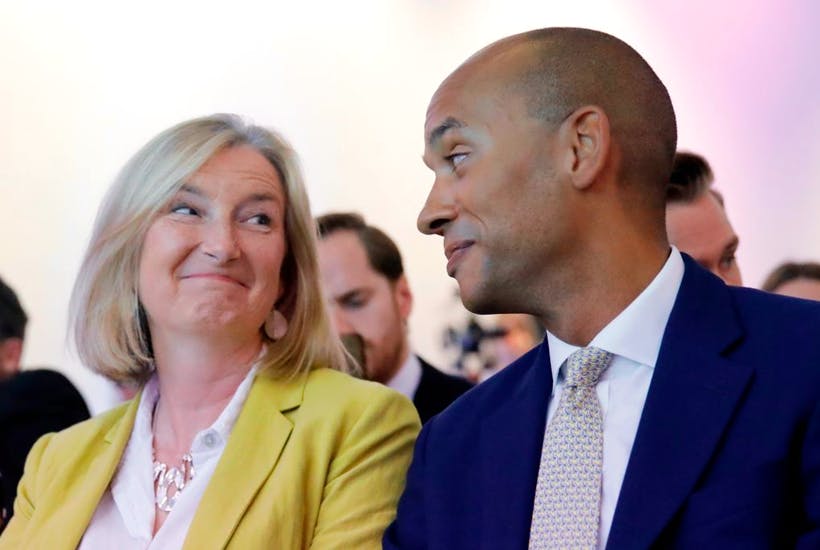A week on from Brexit day, it is worth stopping and reflecting on just how Britain’s departure from the EU actually came about. We’re familiar of course with those from the Leave side who contributed to Brexit. But what about the unintentional heroes of Brexit, those who ensured accidentally that Britain really did leave the EU?
On the day we were supposed to leave the EU last March, I bumped into an important member of Tony Blair’s social and political circle in the lobby of a St James’s club.
“Are the Tory Spartans holding firm? Are they going to stop May’s deal going through?” he asked.
“Yes, quite comfortably I think,” I replied.
“Good,” he said, “that’s what we need.”
He left me in no doubt that blocking May’s deal was seen by some as an essential precursor to stopping Brexit altogether by means of a second referendum.
Fortunately such thinking was shared by almost every Remainer MP that day. They subsequently voted it down. So the deal that Theresa May and Olly Robbins had designed as a bridge to the “closest possible relationship” between the UK and the EU (i.e. the deliberate handing to Brussels of the power to entrap us permanently in its rules) was scuppered for good.
Those MPs who turned down May’s shocker of a deal because they wanted nothing less than to cancel implementation of the referendum verdict altogether will surely be counted in an important category by future historians of this period: the unintentional heroes of Brexit.
There are many other actions by explicitly anti-Brexit campaigners that would admit them to this not very exclusive club.
Take, for example, Jo Swinson’s decision to get behind Boris Johnson’s wish for an early general election because she had been persuaded that the Lib Dems were well placed to make sweeping gains.
Anti-Brexit Lib Dem defector Chuka Umunna was a particularly enthusiastic advocate of this collective decision of the Lib Dem leadership. He said of an early December election:
‘We want to see Remain MPs in Parliament and that’s the only way we think to stop Brexit because you cannot rely on a Labour party that has a significant minority of MPs who don’t want to stop Brexit who want to help it happen’
For making a decision that paved the way for Boris Johnson’s escape from the parliamentary predicament he was in, Umunna, too, must be counted as an accidental hero of Brexit. Thank you Jo and thank you Chuka.
And let’s not forget Gina Miller, who fought – and won – a court case that forced May to secure a Commons majority for her putative Brexit treaty rather than being permitted to push it through on prerogative powers.
Were it not for Ms Miller, May’s lock-in would have been enacted and pro-Brexit voters would now be contemplating the ugly truth that restored EU membership would give the UK more agency over its own fate than the ghastly form of non-membership devised by May.
Next we must turn to those who devised the ill-starred Tory “dementia tax” of the 2017 general election that deprived May of the majority she seemed certain to win. At the time, May’s creation of a hung parliament struck me as a disaster for Brexit. In fact, it turned out to be a huge blessing, scuppering her own dismal Brexit deal.
One of the proposal’s authors, May’s adviser Nick Timothy, was Downing Street’s most important pro-Brexit voice. He had been involved in the Vote Leave campaign, so we must leave him out of the club of accidental heroes. But his co-author on the Tory manifesto was Ben Gummer, a passionately pro-EU Tory MP. So, thanks Ben. A Brexit campaign medal is yours for the asking.
Angela Merkel and all the other EU leaders who humiliated David Cameron by giving him nothing of substance during his attempt to renegotiate the terms of British membership also provided us with an essential contribution. Given her seniority, nothing less than granting her a full state visit would seem a sufficient reward.
Finally, hero status must go to Jeremy Corbyn. Labour’s leader ensured, one presumes unintentionally, that the dominant pro-Remain offer at the 2019 general election was so polluted by socialism that people who might have been open to backing a Remainer party swung behind Boris Johnson instead. That’s got to be worth a Queen’s Gallantry Medal at least.
Historian Robert Conquest’s Third Law of politics states that the behaviour of any bureaucratic organisation is best understood by assuming it is controlled by a secret cabal of its enemies. The Brexit blockers did not form a single organisation and never seemed particularly bogged down in bureaucracy. But nonetheless, they succeeded in shooting their own desired objective in the foot on numerous occasions. Now that Brexit is done, it’s important to stop and remember these heroes of Brexit, even if they would themselves presumably be quite modest about their role.
The odds are that I will bump into my Blairite chum again before very long. And when I do, I am sure he will wish to join me in a chuckle at how it all worked out in the end.







Comments